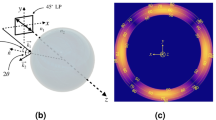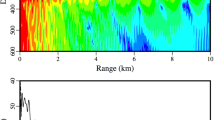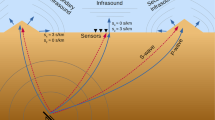Abstract
ONE of the most fruitful methods of investigating the Heaviside layer is that originated by Breit and Tuve, in which a series of short impulses of the order of 0.2 of a millisecond in duration are transmitted and the direct ray and echoes reflected at nearly normal incidence are observed at a neighbouring station. The echo patterns observed are often very complex and it has been found that a single F layer echo, say, is often split into two fairly closely spaced components. This has been attributed by Appleton to the double refraction suffered by a ray in passing through the ionised regions of the upper layer.
This is a preview of subscription content, access via your institution
Access options
Subscribe to this journal
Receive 51 print issues and online access
$199.00 per year
only $3.90 per issue
Buy this article
- Purchase on Springer Link
- Instant access to full article PDF
Prices may be subject to local taxes which are calculated during checkout
Similar content being viewed by others
Author information
Authors and Affiliations
Rights and permissions
About this article
Cite this article
ECKERSLEY, T. Polarisation of Echoes from the Heaviside Layer. Nature 130, 398–399 (1932). https://doi.org/10.1038/130398b0
Issue Date:
DOI: https://doi.org/10.1038/130398b0
Comments
By submitting a comment you agree to abide by our Terms and Community Guidelines. If you find something abusive or that does not comply with our terms or guidelines please flag it as inappropriate.



